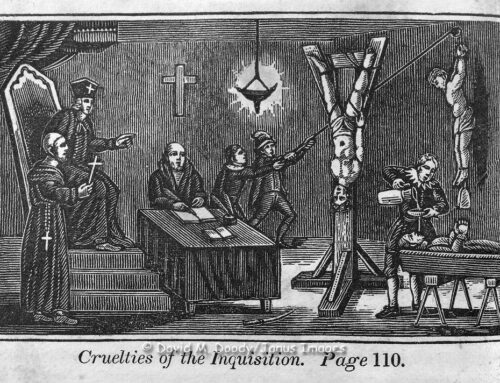Shapers of Christianity: John Wesley (1703–91)
By Nick Needham
Reprinted from The Banner of Truth Magazine
Issue #717, June 2023
ADDED VIDEO NOT IN THE BANNER OF TRUTH MAGAZINE
“I received some blows, lost part of my clothes, and was covered over with dirt: here, although the hands of perhaps some hundreds of people were lifted up to strike or throw, yet they were one and all stopped in the midway; so that not a man touched me with one of his fingers, neither was anything thrown from first to last; so that I had not even a speck of dirt on my clothes. Who can deny that God heareth prayer, or that He hath all power in heaven and earth?”
—Wesley’s Journal for 4 July 1745, describing his evangelism in Falmouth
John Wesley is well-known as the ‘Father of English Methodism.’ His abiding impact on world Christianity is undisputed. Had it not been for the epic labours of Wesley and his Methodist co-workers in the eighteenth century, vast swathes of England and the English-speaking peoples would have remained untouched by the Gospel.
One of the most absorbing aspects of Wesley’s life is his anguished pilgrimage to an assured faith in Christ. He was raised within the High Church Arminian school of Anglicanism, which perceived God’s grace as channelled through the Episcopal church order and its sacraments. This was Wesley’s outlook when he dominated the ‘Holy Club’ at Oxford University (the perhaps unlikely seedbed of the Evangelical Revival), and when he went to Savannah, Georgia, to minister in Colonial America. The latter venture proved a failure, leaving Wesley deeply disillusioned with himself. His words on returning to England in early 1738 resonate with a soul-searching honesty that make so much modern Christianity seem so shallow:
It is now two years and almost four months since I left my native country in order to teach the Georgian Indians [native Americans] the nature of Christianity—but what have I learned myself in the meantime? Why (what I the last of all suspected), that I, who went to America to convert others, was never myself converted to God… This, then, have I learned in the ends of the earth: that I am fallen short of the glory of God, that my whole heart is altogether corrupt and abominable, and, consequently, my whole life (seeing that it cannot be that an evil tree should bring forth good fruit) is alienated from the life of God. I am a child of wrath, an heir of Hell. My own works, my own sufferings, and my own righteousness are so far from making any atonement for the least of my sins, which are more in number than the hairs of my head, the best of them need atonement, or they cannot abide His righteous judgment. Having the sentence of death in my heart, and having nothing in or of myself to plead, I have no hope but that of being justified freely through the redemption that is in Jesus.
Wesley was brought to saving faith by twin influences radiating from Germany: the Moravian movement and Martin Luther. The Moravians were the descendants of the fifteenth-century Hussites, who in 1727 had experienced remarkable revival, the ‘Moravian Pentecost,’ under the leadership of Nicholas von Zinzendorf (1700–1760), who had given shelter on his land in Saxony to Hussite refugees fleeing from Catholic persecution. Wesley encountered a group of Moravians on the ship that took him out to Georgia, and was astounded by their serene faith in Christ in the face of impending death, as a storm threatened to sink the vessel. Wesley kept up contact with Moravians in Georgia, and on returning to England, virtually put himself under the spiritual guidance of Moravian pastor Peter Boehler (1712–75), fascinated by the Moravian doctrine and experience of assured faith (which he still lacked).
Wesley’s conversion was mediated through a Moravian ‘Society’ meeting in Aldersgate Street, London, in May 1738. (These ‘Societies’ were associations of believers for mutual edification outside of formal Sunday worship, an integral element in Moravian religious life.) This meeting introduced Wesley to the second German influence in his conversion— Martin Luther. In Wesley’s words:
In the evening I went very unwillingly to a Society in Aldersgate Street, where one was reading Luther’s preface to the Epistle to the Romans. About a quarter before nine, while he was describing the change which God works in the heart through faith in Christ, I felt my heart strangely warmed. I felt I did trust in Christ, Christ alone for salvation, and an assurance was given me that He had taken away my sins, even mine, and saved me from the law of sin and death.
Thus occurred the most famous conversion in English religious history. A year later, inspired by the example of his Calvinist friend George Whitefield, Wesley took the momentous step of engaging in open-air preaching, at St Philip’s Marsh, near Bristol. Wesley proved as effective an open-air preacher as Whitefield, although their styles differed hugely. Whitefield was emotionally intense, dramatic, even theatrical: he would cry out, stamp his feet, weep, ‘act out’ biblical characters and events, and invent his own conversations with different figures from the scriptural narrative, all in a piercingly loud voice. Wesley by contrast was far more restrained, moderate, and ‘factual’ in manner, more narrowly focused on delivering a straightforward doctrinal message. But his delivery was powerful, and multitudes were soon professing conversion. Again modelling himself on Whitefield, Wesley became a travelling preacher, who everywhere exploited the open-air meeting as a chief instrument for bringing Christ to the unchurched masses. Remarkably, perhaps, Wesley never enjoyed open-air preaching (‘field-preaching,’ as he called it), but submitted to it as a God- given means of reaching greater numbers. As he commented in 1759:
I preached to twice the people we should have had at the house [church]. What marvel the devil does not love field-preaching! Neither do I: I love a commodious room, a soft cushion, a handsome pulpit. But where is my zeal, if I do not trample all these under foot in order to save one more soul?
Wesley’s almost unparalleled impact was not restricted to his own preaching. He trained a whole generation of Methodist lay preachers who journeyed throughout England, replicating Wesley’s message of salvation by faith; some of these men came close to being Wesley’s equals in popular influence, e.g. the converted stonemason John Nelson (1707–74), whose heroic evangelistic labours in York, Sheffield, Leeds, and Manchester were instrumental in establishing flourishing bodies of Methodists in those cities.
Further, Wesley organized converts into the Societies he had seen functioning among the Moravians. The formal worship of ‘Sunday Christianity’ was ineffective, in Wesley’s view, for nurturing meaningful faith and sanctification; the Societies gave opportunity for a more personal and authentically communal expression of spiritual life. From 1742, these Societies included the ‘class meeting.’ This was a smaller, more intimate body of between ten and twelve people, drawn from a mixture of backgrounds (age, social occupation, length of time a person had been a convert). It met every week with a view to promoting the spiritual life of members. This was fulfilled through each member giving an account of how they were doing spiritually. These testimonies encouraged openness and honesty about the state of a person’s faith, and trained people in expressing their life- experiences. There was an agreed set of spiritual rules for the guidance of conduct, drawn up by Wesley in 1743, and class members were interviewed regularly to see whether they were abiding by these rules.
Wesley’s organizational genius forged Methodism into one of the greatest success stories in English religious history. By the time of Wesley’s death in 1791, his Societies had a listed 71,688 members and 294 preachers in Britain, and 43,265 members and 198 preachers in America. The statistics speak for themselves, especially given relatively small population levels in the eighteenth century, and the intensely committed nature of Society membership.
Of course, there remains the question of Wesley’s Arminianism; but a cautionary note should perhaps be sounded. Wesley’s brand of Arminianism was far removed from the prevailing type of Arminianism too often encountered today. The chief difference is found in Wesley’s belief in total depravity. By nature, he held, the human will lies in a bondage to sin as grim and devastating as Augustine, Luther, and Calvin had ever taught. Contrast this with today’s ‘popular Arminianism’ (as we might call it) which teaches that man’s will is by nature free—a position more akin to the Pelagian heresy combatted by Augustine.
What separated Wesley from Augustine, Luther, and Calvin was his belief that human nature’s total depravity has been offset by a universal gift of grace, flowing from the work of Christ, which enables people to respond positively to the Holy Spirit—sufficient or prevenient grace, in Wesleyan parlance. This differs from Augustine, Luther, and Calvin’s conviction that divine grace does not merely enable, but efficaciously produces, man’s positive response to the Gospel. Even so, it seems only right and truthful to recognize how much closer Wesley stood to Reformation teaching on this topic, in contrast with the modern Arminian exaltation of man’s will as free by nature.
It might be useful to close with an anecdote credited to George Whitefield, who was once asked by a narrow-minded fellow Calvinist ‘whether we shall see Mr. Wesley in heaven.’ Whitefield replied, ‘No, we shall not see him; for he shall be so close to the Throne, and we so far away, that we will not be able to see him.’ A truly sovereign God need not limit himself to working through those with a fully correct understanding of his sovereignty.







Leave a Reply, please --- thank you.